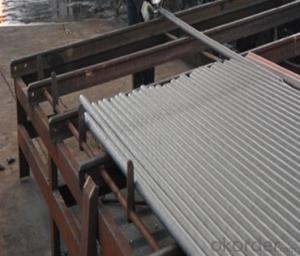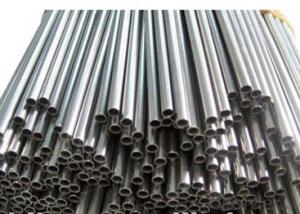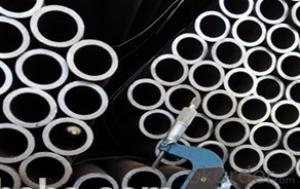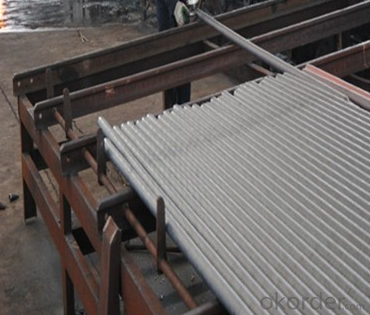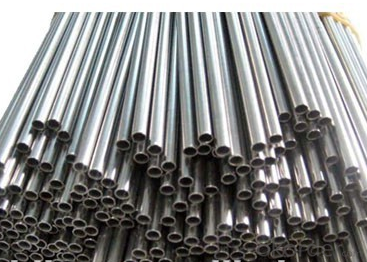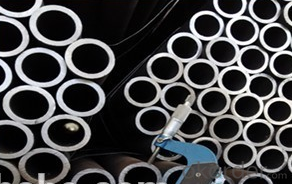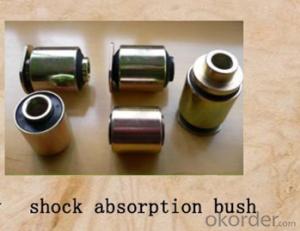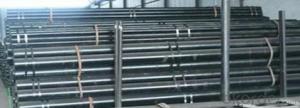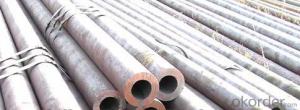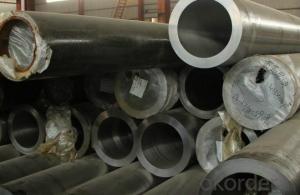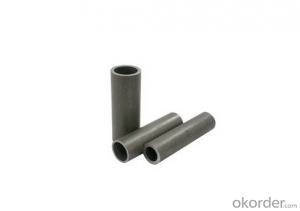1020 Carbon Seamless Steel Pipe 10 CNBM
- Loading Port:
- Qingdao
- Payment Terms:
- TT OR LC
- Min Order Qty:
- 10 pc
- Supply Capability:
- 30 pc/month
OKorder Service Pledge
OKorder Financial Service
You Might Also Like
Quick Details
| Thickness: | 1 - 40 mm | Section Shape: | Round | Outer Diameter: | 21.3 - 609.6 mm |
| Secondary Or Not: | Non-secondary | Application: | Fluid Pipe | ||
| Technique: | Hot Rolled | Certification: | BV | Surface Treatment: | Other |
| Special Pipe: | Thick Wall Pipe | Alloy Or Not: | Non-alloy | Standard: | API 5L,API |
Packaging & Delivery
| Packaging Detail: | Standard seaworthy export packing with steel strip or with plastic clothe, or as requests from the coustomer. |
| Delivery Detail: | 7-25 days after receiveved the deposit |
Specifications
Seamless Steel Pipe
Standard:API ASTM DIN
Size:OD:21.3mm-609.6mm
WT:1mm-40mm
Mechanical properties
standard | grade | Tensile strength(MPA) | yield strength(MPA) |
ASTM A106 | A | ≥330 | ≥205 |
B | ≥415 | ≥240 | |
C | ≥485 | ≥275 |
Chemical ingredients
standard | grade | Chemical ingredients | |||||||||
C | Si | Mn | P | S | Cr | Mo | Cu | Ni | V | ||
ASTM A106 | A | ≤0.25 | ≥0.10 | 0.27~0.93 | ≤0.035 | ≤0.035 | ≤0.40 | ≤0.15 | ≤0.40 | ≤0.40 | ≤0.08 |
B | ≤0.30 | ≥0.10 | 0.29~1.06 | ≤0.035 | ≤0.035 | ≤0.40 | ≤0.15 | ≤0.40 | ≤0.40 | ≤0.08 | |
C | ≤0.35 | ≥0.10 | 0.29~1.06 | ≤0.35 | ≤0.35 | ≤0.40 | ≤0.15 | ≤0.40 | ≤0.40 | ≤0.08 | |
| Company Name | Tianjin Xinlianxin | ||
| Business Type | Manufacturer and Exporter | ||
| Product | steel pipe | ||
| Main Products and Standards | |||
| product name | Specification Range | steel Grade | Executive Standard |
| Structure Pipe | 20mm-820mm 1/2"-32" | 10,20,35,45,16Mn,A53AB | GB/T8162-1999,ASTM A53-98,ASTM500-98,ASTM 500-98,JISG3441-1998,JISG3444-1994 |
| Pipe for Liquid Transportation | 20mm-820mm 1/2"-33" | 10,20,Q345(16Mn),A53AB,A192,SGP | GB/T8163-1999,ASTM A53-98,ASTM A192,JISG3452-1997 |
| Boiler Pipe | 20mm-820mm 1/2"-35" | 20,20G,A179,A106B,A192,ST37.0,ST44.0,ST35.8,ST45.8,Gr320 | GB3087-1999,GB5310-1995,ASTM A106,ASTM A179,ASTM A192,DIN-1629-1984,DIN17175,BS3059.1-1987 |
| 1 | Product | seamless steel pipe | |
| 2 | Standard | U.S.A. | ASTM A53/A106/A178/A179/A192/A210/A213/ A333/A335/A283/A135/A214/A315/A500/A501/A519/A161/A334 API 5L/5CT |
| Japan | JIS G3452/G3454/G3456/G3457/G3458/G3460/3461/3462/3464 | ||
| German | DIN 1626/17175/1629-4/2448/2391/17200 SEW680 | ||
| Britain | BS 1387/1600/1717/1640/3601/3602/3059/1775 | ||
| Russia | GOST 8732/8731/3183 | ||
| China | GB/T8162/T8163 GB5310/6579/9948 | ||
| 3 | Material Grade | U.S.A. | Gr. B/Gr.A/A179/A192/A-1/T11/T12/T22/P1/FP1/T5/4140/4130 |
| Japan | STPG38,STB30,STS38,STB33,STB42,STS49, STBA23,STPA25,STPA23,STBA20 | ||
| German | ST33,ST37,ST35,ST35.8,ST45,ST52,15Mo3, 13CrMo44, 1.0309, 1.0305, 1.0405 | ||
| Britain | Low, Medium, high | ||
| Russia | 10, 20, 35, 45, 20X | ||
| China | 10#, 20#, 16Mn, 20G, 15MoG, 15CrMo, 30CrMo, 42Crmo, 27SiMn, 20CrMo | ||
| 4 | Out Diameter | 21.3mm-609.6mm | |
| 5 | Wall Thickness | 2.31mm-40mm | |
| 6 | Length | As per customers' requirements | |
| 7 | Protection | Plastic caps/ Wooden case | |
| 8 | Surface | Black painting/varnished surface,anti-corrosion oil, galvanized or as per required by customer | |
- Q: Can steel pipes be used for underground cooling systems?
- Indeed, underground cooling systems can make use of steel pipes. Thanks to their durability, strength, and resistance to corrosion, steel pipes are widely employed in numerous applications, including underground cooling systems. They are adept at handling the rigorous demands of cooling systems, such as high pressure and temperature requirements. Moreover, steel pipes can be conveniently installed and maintained by means of welding or threading them together. Nonetheless, it is crucial to ensure that the steel pipes are adequately coated or insulated in order to avert corrosion and uphold heat transfer efficiency.
- Q: How are steel pipes used in hydroelectric power plants?
- Steel pipes are used in hydroelectric power plants to transport water from the reservoir to the turbines. These pipes are designed to withstand high pressure and are often used for penstocks, which are large vertical pipes that deliver water to the turbines at a controlled rate. The durability and strength of steel pipes make them ideal for withstanding the force of the flowing water and ensuring a reliable water supply for power generation.
- Q: What are the common protective coatings used on the inner surface of steel pipes?
- The common protective coatings used on the inner surface of steel pipes include epoxy, polyurethane, and cement mortar coatings. These coatings provide corrosion resistance, prevent the formation of scales, and improve the durability and lifespan of the pipes.
- Q: What is the weight and strength of steel pipes?
- The weight and strength of steel pipes differ based on their dimensions and the specific steel grade utilized. Typically, the weight of steel pipes is measured in pounds per foot or kilograms per meter. The strength of steel pipes is commonly evaluated in terms of yield strength and ultimate tensile strength. The weight of steel pipes can range from a few pounds per foot for smaller sizes to several hundred pounds per foot for larger diameters and thicker walls. Various factors, including the pipe's outer diameter, wall thickness, and length, impact the weight. For example, a 1-inch diameter steel pipe with a wall thickness of 0.125 inches may weigh approximately 0.67 pounds per foot. Conversely, a 12-inch diameter steel pipe with a wall thickness of 0.5 inches can weigh roughly 142 pounds per foot. The strength of steel pipes is determined by the grade of steel used, which can vary depending on the specific application and requirements. Commonly used steel grades for pipes include ASTM A53 for general purposes, ASTM A106 for high-temperature service, and API 5L for oil and gas transportation. These grades possess different yield strengths and ultimate tensile strengths. Yield strength denotes the amount of stress a steel pipe can endure before it starts to deform plastically. It is usually measured in pounds per square inch (psi) or megapascals (MPa). For instance, ASTM A53 Grade B steel pipe has a minimum yield strength of 35,000 psi (240 MPa), while API 5L Grade X65 steel pipe has a minimum yield strength of 65,000 psi (448 MPa). On the other hand, ultimate tensile strength signifies the maximum stress a steel pipe can withstand before fracturing. It is also measured in psi or MPa. For example, ASTM A106 Grade B steel pipe has an ultimate tensile strength of 60,000 psi (415 MPa), whereas API 5L Grade X65 steel pipe has an ultimate tensile strength of 77,000 psi (531 MPa). In conclusion, the weight and strength of steel pipes can vary based on their dimensions and the grade of steel used. The weight is influenced by factors like the pipe's diameter, wall thickness, and length, while the strength is determined by the steel's yield strength and ultimate tensile strength.
- Q: What are the safety precautions while working with steel pipes?
- When working with steel pipes, it is important to follow several safety precautions. Firstly, always wear protective gear such as gloves, safety glasses, and steel-toed boots to prevent injuries. Secondly, ensure that the work area is properly ventilated to avoid inhaling harmful fumes or gases. Additionally, use caution when handling heavy pipes to prevent strains or sprains. Lastly, be mindful of potential hazards such as sharp edges, hot surfaces, or falling objects, and take appropriate measures to minimize risks.
- Q: What are the different methods of non-destructive testing for steel pipes?
- Some of the different methods of non-destructive testing for steel pipes include ultrasonic testing, magnetic particle testing, eddy current testing, radiographic testing, and visual inspection. These methods are used to detect surface and subsurface defects, such as cracks, corrosion, and discontinuities, without causing any damage to the pipes.
- Q: How are steel pipes used in offshore drilling platforms?
- Steel pipes are used in offshore drilling platforms for various purposes such as transporting drilling fluids, casing and cementing operations, as well as providing support and stability to the platform structure. These pipes are crucial in facilitating the extraction of oil and gas from beneath the seabed by enabling the safe and efficient transfer of fluids and materials during drilling operations.
- Q: Can steel pipes withstand high temperatures?
- Yes, steel pipes can withstand high temperatures. Steel is a strong and durable material that has high heat resistance. It can retain its strength and structural integrity even when exposed to extreme heat, making it suitable for various high-temperature applications such as industrial furnaces, power plants, and steam pipelines.
- Q: Galvanized steel pipe DN100 and SC100
- Zinc plating, hot dip galvanizing and cold galvanizing, to see the design instructions and design requirements, which will explain
- Q: Can steel pipes be used for the construction of dams?
- Yes, steel pipes can be used for the construction of dams. Steel pipes are commonly used in dam construction for various purposes such as intake and outlet structures, penstocks, and piping systems for transporting water. Steel pipes offer high strength, durability, and resistance to corrosion, making them suitable for withstanding the water pressure and environmental conditions in dam projects.
Send your message to us
1020 Carbon Seamless Steel Pipe 10 CNBM
- Loading Port:
- Qingdao
- Payment Terms:
- TT OR LC
- Min Order Qty:
- 10 pc
- Supply Capability:
- 30 pc/month
OKorder Service Pledge
OKorder Financial Service
Similar products
Hot products
Hot Searches
Related keywords
